calsfoundation@cals.org
Joseph Taylor Robinson (1872–1937)
Twenty-third Governor (1913)
Joseph Taylor Robinson was governor only a short time before taking office as a U.S. senator. He became Senate majority leader during the Great Depression, after his nomination as the Democratic Party candidate for vice president—the first Arkansan ever on a major party ticket.
Joe T. Robinson was born on August 26, 1872, in Concord Township of Lonoke County to James Madison Robinson—a doctor, farmer, and lay preacher from New York—and Matilda Jane Swaim of Tennessee. Usually attending the local one-room schoolhouse during the summer, he received fewer than forty-six months of formal education. He augmented his schooling by reading classics from his father’s extensive library. In his childhood, he chopped cotton and tended to his father’s apple orchard. During his teenage years, he made a reputation as a public speaker, winning forensic exchanges in both political and religious contests. At seventeen, he took the local test and was licensed to teach first grade in the county schools. After two years of teaching, he enrolled in the University of Arkansas (UA) in Fayetteville (Washington County), attending for one year until his father’s death in 1892, when he returned to Lonoke (Lonoke County). There he studied law with Thomas C. Trimble, a judge and political leader.
In 1894, Robinson defeated the Populist candidate for state representative and became the youngest member of the Arkansas General Assembly at age twenty-two. He introduced a bill to create a commission, similar to the Interstate Commerce Commission, to regulate state railroad rates. The bill was defeated, but in the next legislature, a similar bill was passed as an amendment to the state constitution and sent to the voters, who approved it overwhelmingly in 1898 by 63,703 to 16,940.
On December 15, 1896, Robinson married Ewilda “Billie” Grady Miller, a local beauty. The couple had no children.
After his one term in the legislature, Robinson concentrated on his growing law practice, earning enough income to allow him to re-enter politics. In 1902, he won a seat in the U.S. House of Representatives, a position he held for a decade. With the Democrats in the minority and unable to pass their own bills, Robinson supported such progressive Republican legislation as railroad regulation, the Pure Food and Drug Act, campaign contribution restrictions, the graduated income tax, and the direct election of senators.
Robinson’s career took many rapid turns in 1912. He announced he would run for the Senate against the incumbent Jeff Davis, but after assaying Davis’s strength, he changed his mind. He ran for governor instead, and bested George W. Donaghey by nearly a two-to-one margin. But before Robinson’s inauguration, the recently reelected Davis died of a heart attack. Robinson won a close vote for Davis’s Senate seat. As governor, Robinson pushed through a progressive agenda for the state. He proposed, and the legislature enacted, laws creating a state banking board, a state health board, and the Arkansas Highway Commission. He also oversaw the reform of the penitentiary system, including a paid oversight board and the outlawing of the notorious convict-leasing system. He also worked for ratification of the Seventeenth Amendment and the direct election of senators by the people. But on March 8, 1913, he resigned the governorship to take his Senate seat, causing a crisis in the state as Arkansas did not have the position of lieutenant governor.
In the Senate, Robinson became a politician of national stature. He stood by President Woodrow Wilson, leading fights for progressive legislation, such as a proposal to end child labor, and for wartime measures, the arming of merchant ships, and the declaration of war against Germany in 1917. After the war, he helped direct the unsuccessful battle for ratification of the Versailles Treaty, earning a reputation as a master tactician and excellent parliamentarian. In recognition of his efforts, he was chosen the permanent chairman of the 1920 Democratic National Convention.
His fame and power grew throughout the 1920s. In 1923, he became the Democratic leader of the Senate. Then, in 1924, he was one of many “favorite son” candidates nominated for president of the United States. As the convention deadlocked through 102 ballots, The New York Times anointed Robinson the “obvious compromise candidate.” Instead, the delegates chose John W. Davis, a Wall Street lawyer.
In 1928, Robinson made headlines again when, on the floor of the Senate, he attacked the anti-Catholic religious bigotry of Alabama senator Tom Heflin and the Ku Klux Klan. Because of this speech, he became a champion of religious toleration, a big issue at the time since the presumed Democratic nominee for president, Al Smith, was Catholic. Robinson was then chosen to serve as the permanent chairman of the Democratic National Convention in Houston, Texas. And shortly thereafter, Al Smith, governor of New York, selected him as his running mate; Robinson’s outspoken attack on religious prejudice in America, as well as his Southern roots, were seen as important to the ticket. Many politicos predicted that Southerners would never vote for an anti-prohibitionist Catholic for president; many believed that Robinson could help to deliver the “solid South” to the Democrats once more. When the Democrats officially nominated him for the vice-presidency on June 29, 1928, he became the first Arkansan ever nominated for a national office. By train, Robinson campaigned for thousands of miles across the South and the West. Herbert Hoover won the presidency, however. The next year, Hoover named Robinson as the only Democratic delegate to the London Naval Disarmament Conference. Upon his return, he secured enough Democratic votes in the U.S. Senate for the London Naval Disarmament Treaty to ensure its passage.
As the Great Depression of the 1930s grew, so did Robinson’s prestige. After the 1932 election, with the Democrats in control of the federal government, Robinson became the majority leader of the Senate. From this position, he pushed President Franklin Roosevelt’s New Deal legislation through a sometimes reluctant Senate. In 1933, he guided the Emergency Banking Act through the Senate and introduced and pushed for passage of the Civilian Conservation Corps, the Agricultural Adjustment Act, the Federal Emergency Relief Act, the Work Relief Act, the Home Owners Loan Act, and the Railroad Coordination Act.
After 1933, he continued to support Roosevelt’s program, in both foreign and domestic battles. In 1935, he led an unsuccessful attempt to bring the United States into the World Court. He supported other Roosevelt measures, such as the Social Security Act and the Rural Electrification Act, even while pushing through the Robinson-Patman Anti-Price Discrimination Act to protect small retailers from large chain stores; he pushed the Robinson-Patman Act through Congress without administration support.
Roosevelt acknowledged Robinson’s many contributions on numerous occasions, most notably when he came to Arkansas in 1936—the first time a sitting president had visited the state. Arriving for the main centennial celebration at the capitol on June 10, 1936, Roosevelt then went to Robinson’s home for a private luncheon and reception. Later that summer, he served as the Permanent Chairman of the Democratic National Convention, his third time to hold that office. Later that year, the state further honored Robinson by having a special centennial coin struck with his picture on one side. Perhaps the most controversial stand that Robinson took during the year was in his opposition to the Southern Tenant Farmers’ Union (STFU), which was trying to organize the overworked and underpaid day laborers in the Delta region. He defended the large landowners, arguing to the president that “outside agitators” were orchestrating the troubles. Personally, he hated that the STFU leader, H. L. Mitchell, and called him “Greasy Joe.” In the end, the large landowners won. Robinson also played a key role in the regular filibustering of anti-lynching legislation throughout his years in office.
Robinson’s career came to an end in 1937 during one of the most heated Senate conflicts of the twentieth century—Roosevelt’s plan to enlarge the U.S. Supreme Court. In June 1937, Roosevelt offered Robinson a seat on the Court—if he could get Senate support to add up to six new justices. For the next month, Robinson led the floor fight in the bitter battle over the Roosevelt proposal in the hot Senate chamber. Suddenly, on July 14, 1937, the skirmish ended when Robinson died in his apartment, apparently the victim of a heart attack. He was laid to rest in Roselawn Cemetery in Little Rock (Pulaski County). The Joseph Taylor Robinson House has been designated a National Historic Landmark, and Robinson Center Music Hall was named after him.
For additional information:
Franklin D. Roosevelt, Official Files. Franklin D. Roosevelt Library, Hyde Park, New York.
Franklin D. Roosevelt, President’s Personal Files. Franklin D. Roosevelt Library, Hyde Park, New York.
Grant, Gilbert Richard. “Joseph Taylor Robinson in Foreign Affairs.” Arkansas Historical Quarterly 9 (Autumn 1950): 133–171.
Joseph Taylor Robinson Papers. Special Collections. University of Arkansas Libraries, Fayetteville, Arkansas.
Lancaster, Bob. “Joe T. Robinson: Arkansas’s Other National Candidate.” Arkansas Times, September 3, 1992, pp. 20–23.
Ledbetter, Cal, Jr. “Joe T. Robinson and the Presidential Campaign of 1928.” Arkansas Historical Quarterly 45 (Summer 1986): 95–125.
Pruden, William H. III. “Holding the Line: The Arkansas Congressional Delegation and the Fight over a Federal Antilynching Law.” In Bullets and Fire: Lynching and Authority in Arkansas, 1840–1950, edited by Guy Lancaster. Fayetteville: University of Arkansas Press, 2018.
Razer, Bob. “Joe T. Robinson: The New Deal’s Majority Leader, 1933–1937.” Pulaski County Historical Review 56 (Winter 2008): 100–113.
Towns, Stuart. “Joseph T. Robinson and Arkansas Politics, 1912–1913.” Arkansas Historical Quarterly 24 (Winter 1965): 291–307.
Towns, W. Stuart. “‘Gilded Gateways to Economic Paradise’: The New Deal Rhetoric of Senator Joe. T. Robinson.” Arkansas Review: A Journal of Delta Studies 31 (April 2000): 29–38.
Weller, Cecil Edward, Jr. Joe T. Robinson: Always a Loyal Democrat. Fayetteville: University of Arkansas Press, 1984.
———. “Joseph Taylor Robinson and the Robinson-Patman Act.” Arkansas Historical Quarterly 47 (Spring 1988): 47–69.
Cecil Edward Weller Jr.
San Jacinto College South
This entry, originally published in Arkansas Biography: A Collection of Notable Lives, appears in the CALS Encyclopedia of Arkansas in an altered form. Arkansas Biography is available from the University of Arkansas Press.


 Centennial Robinson Half Dollar
Centennial Robinson Half Dollar  Couch in Washington
Couch in Washington 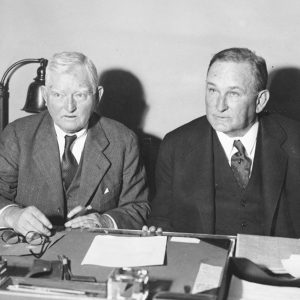 Garner and Robinson
Garner and Robinson 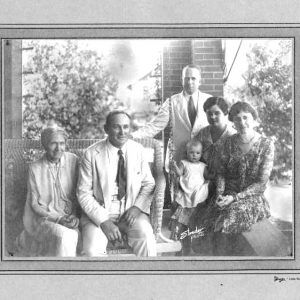 Robinson Family
Robinson Family 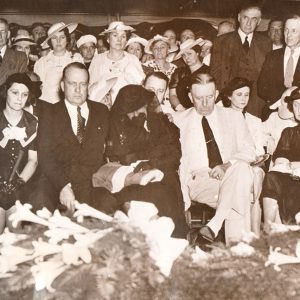 Robinson Funeral
Robinson Funeral 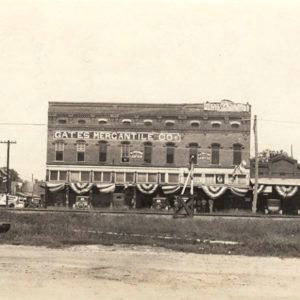 Robinson Homecoming
Robinson Homecoming 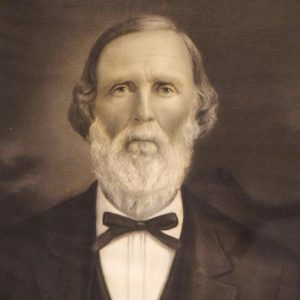 James M. Robinson
James M. Robinson 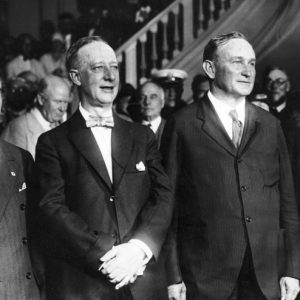 Joe T. Robinson
Joe T. Robinson 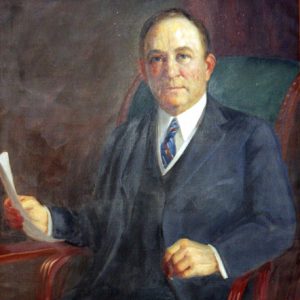 Joe T. Robinson
Joe T. Robinson 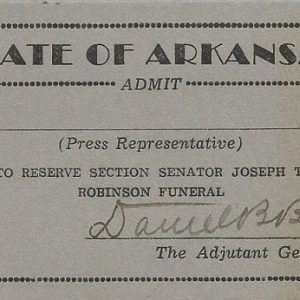 Joe T. Robinson Funeral Ticket
Joe T. Robinson Funeral Ticket 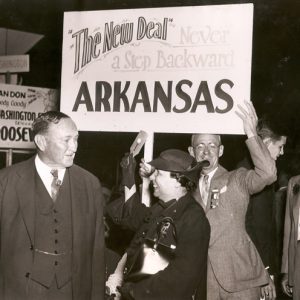 Joe T. Robinson and Hattie Caraway
Joe T. Robinson and Hattie Caraway 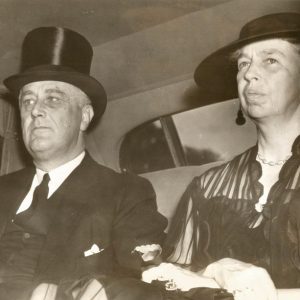 Joe T. Robinson Funeral
Joe T. Robinson Funeral 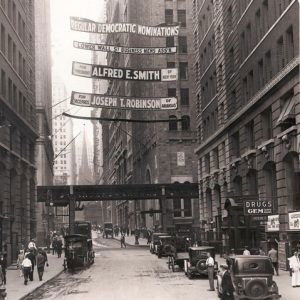 Smith/Robinson Campaign Signs
Smith/Robinson Campaign Signs  Joe T. Robinson and W. T. Shepherd
Joe T. Robinson and W. T. Shepherd 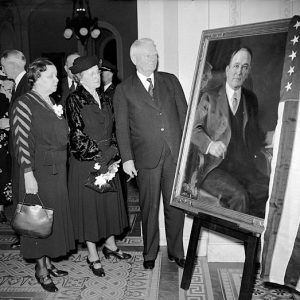 Joe T. Robinson Portrait
Joe T. Robinson Portrait 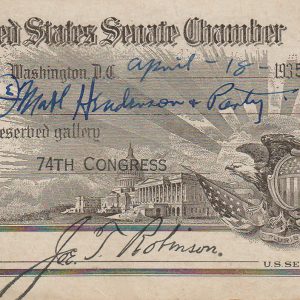 Joe T. Robinson Senate Gallery Pass
Joe T. Robinson Senate Gallery Pass  Joe T. Robinson Badge
Joe T. Robinson Badge  Robinson Memorial Volume
Robinson Memorial Volume 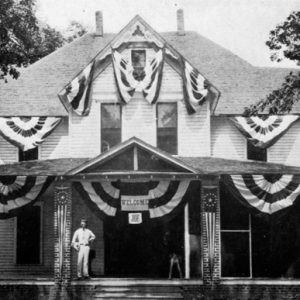 Joseph Taylor Robinson House
Joseph Taylor Robinson House 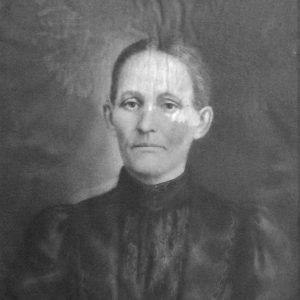 Matilda J. Robinson
Matilda J. Robinson 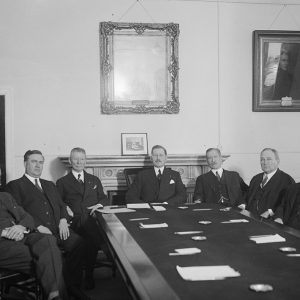 War Profits Commission
War Profits Commission 




Comments
No comments on this entry yet.